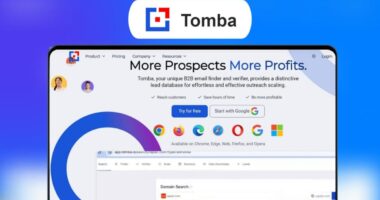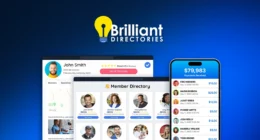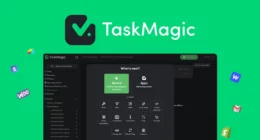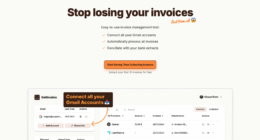Learning Management Software (LMS) helps small businesses modernize their training programs while reducing costs by up to 30%. Popular solutions like TalentLMS and SkyPrep offer user-friendly features for managing employee development, tracking progress, and delivering engaging content. Key considerations include budget alignment, mobile compatibility, and scalability. The right LMS combines automated content management, customizable learning paths, and performance analytics. Understanding implementation strategies and ROI metrics reveals the full potential of these powerful training tools.
Quick Overview
- Small businesses can reduce training costs by up to 30% and increase productivity by 24% with an effective LMS platform.
- TalentLMS, PlutoLMS, SkyPrep, and Rippling Learning Management offer cost-effective solutions specifically designed for small business needs.
- Essential LMS features include automated content management, customizable learning paths, and comprehensive progress tracking tools.
- Mobile accessibility and on-demand learning capabilities ensure flexible training delivery for employees across different locations and schedules.
- Integration with existing business systems, user-friendly interfaces, and scalable features support long-term business growth and ROI.
Understanding Small Business LMS Essentials

Selecting the right Learning Management System (LMS) stands as an important decision for small businesses aiming to modernize their training programs. Small business owners must carefully evaluate their specific training needs and organizational requirements before making this significant investment.
Key considerations include identifying clear training goals, such as streamlining employee onboarding or ensuring compliance training. The system should offer user-friendly features that both administrators and learners can navigate without extensive training. Research shows that continuous learning opportunities are highly valued, with 76% of professionals preferring companies that prioritize ongoing development.
Choose an LMS that matches your training objectives and provides intuitive navigation for all users without requiring complex instruction.
Additionally, the LMS must align with budget constraints while providing vital capabilities like mobile learning compatibility and engaging content formats.
Integration requirements also play an important role, as the chosen system should work seamlessly with existing business tools like HR software.
Customization options allow businesses to maintain their brand identity throughout the learning experience, creating a more cohesive training environment.
Top LMS Solutions in the Market Today
While the LMS marketplace offers numerous options, several solutions have emerged as standout choices for small businesses seeking effective training platforms. These platforms combine user-friendly features with scalable capabilities to meet growing business needs.
- TalentLMS stands out with its highly customizable interface, free starter plan, and robust e-commerce features for selling courses. The platform's gamification features help boost learner engagement and motivation through interactive elements.
- PlutoLMS, developed by the Moodle team, delivers excellent value with its intuitive cloud-based system and ease of use.
- SkyPrep offers cost-effective solutions with simplified navigation, customizable layouts, and SCORM compliance.
- Rippling Learning Management integrates training with HR, IT, and finance functions, making it a thorough solution for businesses looking to streamline their operations.
These platforms represent the current market leaders regarding functionality, affordability, and scalability for small business needs.
Key Features That Drive Business Growth

As successful businesses leverage technology to enhance their training programs, certain LMS features emerge as critical drivers of organizational growth and development. The most impactful features focus on streamlining operations while maximizing employee potential.
Key growth-driving capabilities include automated content management for efficient material organization, customizable learning paths that adapt to specific business needs, and extensive progress tracking tools. Knowledge verification tools like tests and surveys help ensure employees retain crucial information.
Modern LMS platforms drive growth through smart automation, personalized learning journeys, and comprehensive performance analytics.
Cost-effective solutions like on-demand learning and mobile accessibility enable companies to scale their training efforts without significant additional investment.
Modern LMS platforms also emphasize engagement through interactive elements and gamification, while ensuring compliance through automated certification tracking.
Integration capabilities with existing business systems and scalable architecture make these solutions particularly valuable for growing organizations looking to future-proof their training infrastructure.
Implementation Strategies for Success
The successful implementation of a learning management system requires careful planning and strategic execution to achieve ideal results. Small businesses must focus on methodical deployment while guaranteeing employee engagement throughout the process. Hosting live training webinars can significantly boost employee comfort with the new system.
- Begin with clear goal-setting by establishing SMART objectives that align with your business needs, whether for onboarding, compliance training, or skill development.
- Create an implementation team responsible for overseeing the rollout, including content development, testing, and user support.
- Develop high-quality, engaging content with multimedia elements, organizing materials in a structured way that makes sense for your learners.
- Monitor system performance after launch using analytics and user feedback, making necessary adjustments to improve engagement and effectiveness.
This strategic approach helps guarantee smooth adoption and maximizes return on investment in learning management software.
Measuring ROI and Performance Metrics

Measuring return on investment stands as a critical cornerstone for small businesses implementing learning management software. Studies show that effective LMS solutions can reduce training costs by up to 30% while increasing productivity by 24%. The key lies in tracking specific metrics that demonstrate value. Research indicates that training programs yield an impressive 353% ROI when properly implemented and measured.
| Metric Type | What to Measure | Target Goal |
|---|---|---|
| Financial | Training cost reduction | 20-30% savings |
| Performance | Course completion rates | 60% or higher |
| Productivity | Time-to-competency | 30% reduction |
To accurately measure ROI, businesses should focus on three essential areas: direct cost savings from reduced travel and materials, improved employee performance through assessment scores, and increased productivity metrics. Data analytics tools within modern LMS platforms make it easier to track these measurements, providing clear insights into the system's effectiveness and business impact.
Future-Proofing Your LMS Investment
Successfully future-proofing a learning management system requires businesses to look beyond immediate needs and anticipate technological evolution.
Looking ahead and planning for tomorrow's technology is essential when building a future-ready learning management system.
Small businesses must consider scalability, integration capabilities, and emerging technologies to guarantee their LMS investment remains valuable over time. Training management systems offer enhanced data exchange through robust integration capabilities to provide more comprehensive insights for decision-making.
- Prioritize flexible architecture that enables seamless integration with HR software, CRM platforms, and other business systems while supporting future technological additions.
- Invest in solutions that incorporate AI-driven personalization and mobile learning capabilities to meet evolving user expectations.
- Select platforms with robust APIs and customization options that allow for easy updates and modifications as business needs change.
- Focus on scalable solutions that can grow alongside the business without requiring significant additional investment, supporting both content expansion and user base growth.
Frequently Asked Questions
Can Employees Access LMS Training Materials While Offline?
Yes, employees can access LMS training materials offline through dedicated mobile apps and downloadable content features.
Modern learning management systems like Moodle, Totara, and Paradiso LMS offer robust offline capabilities that allow users to download course materials beforehand.
Once downloaded, employees can complete training sessions, view multimedia content, and track their progress without an internet connection.
When they reconnect, their progress automatically syncs with the system.
How Long Does It Typically Take to Fully Implement an LMS?
The typical LMS implementation timeline ranges from 3 months to 1 year, depending on several key factors.
Cloud-based systems generally deploy faster than on-premise solutions. The timeline is influenced by:
- Company size and complexity
- Amount of existing training content
- Technical requirements and integrations
- Staff training needs
- Customization requirements
Basic setup can be completed in days, but full implementation including content development, testing, and user training requires careful planning and systematic execution.
What Happens to Training Data if We Switch LMS Providers?
Like transferring precious cargo between ships, switching LMS providers requires careful handling of training data.
The process typically involves exporting data from the old system and importing it into the new one. Most modern LMS platforms support standard data formats (SCORM, xAPI) for smooth changes.
During migration, user profiles, completion records, and course content are preserved, though some customizations may need adjusting.
Working with vendors and conducting thorough testing guarantees data integrity throughout the switch.
Are There Industry-Specific LMS Templates Available for Small Businesses?
Yes, many LMS providers offer industry-specific templates designed for small businesses.
These templates cover sectors like healthcare, retail, technology, and finance. Platforms like Moodle provide customizable plugins, while services such as Rippling offer pre-built course catalogs focusing on compliance and role-specific training.
These templates typically include regulatory-compliant content, customizable branding options, and regularly updated materials that align with industry standards, making them particularly valuable for small businesses with limited resources.
Do LMS Platforms Provide Translation Services for Multilingual Workforces?
With over 70% of global businesses operating in multiple languages, most modern LMS platforms offer robust translation capabilities.
These platforms typically provide both automated and manual translation services, supporting 100+ languages.
Key features include:
- Automatic content translation
- Multilingual user interfaces
- Cultural adaptation tools
- Language preference settings
Many platforms integrate with services like Google Translate or DeepL, while offering options for human translation validation to guarantee accuracy and cultural sensitivity.
Conclusion
Selecting the right learning management software flows like a well-orchestrated symphony, harmonizing business needs with technological capabilities. As small businesses navigate the digital learning landscape, a carefully chosen LMS serves as both compass and catalyst for growth. Through thoughtful implementation, regular measurement, and strategic planning, organizations can transform employee development from a periodic task into a continuous journey of achievement and innovation.








